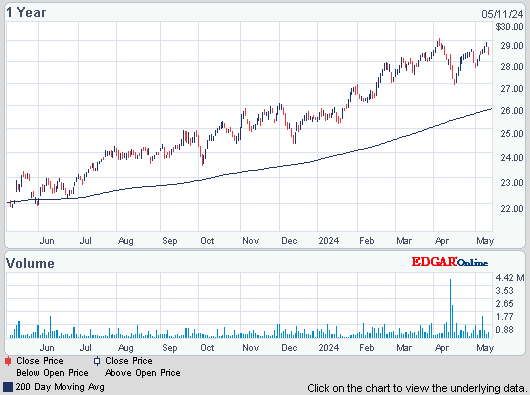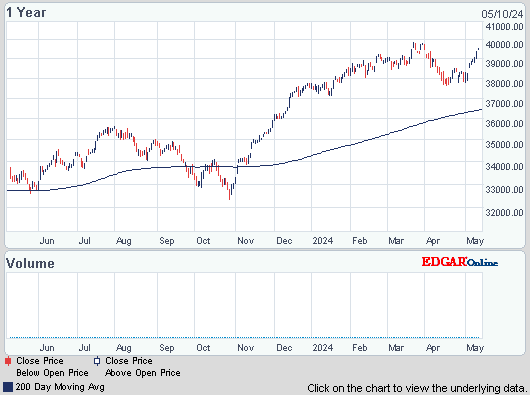Dow gained 125, advancers over decliners 5-2 (but down from the AM reading) & NAZ was up 42. The Financial Index rose 2 to the 241s. The MLP index finished up fractionally to the 434s (essentially matching the record) & the REIT index rose 2 to 285 (but still has a long way to go for a new record). Junk bond funds were generally higher & Treasuries saw a little selling. Oil bounced off the 90 floor & gold crawled a little higher.
AMJ (Alerian MLP Index tracking fund)

![Live 24 hours gold chart [Kitco Inc.]](http://www.kitco.com/images/live/gold.gif)

While congress negotiates a spending plan for the rest of this year, leaders are preserving automatic cuts & seeking ways to give agencies flexibility in implementing the reductions. That work starts this week as the House debates a proposal by the Reps to fund the gov after current spending authority expires Mar 27. The House measure retains the $85B in cuts that took effect Mar 1, a reduction of 5.8% for the rest of the fiscal year. Politicos in both parties & the pres agree they want to avoid a federal shutdown (which would cut off their salaries). The latest feud is as much about which agencies, notably defense, will be given flexibility to manage the reductions as it is about the amount of spending. The across-the-board reductions are set to total $1.2T over the next 9 years, including $85B for the fiscal year that runs thru Sep. Agencies aren’t allowed to shift money to crucial programs from those considered less important. The automatic budget reductions, if they remain in place, will cause a 0.6 percentage-point reduction in US economic growth this year, according to the CBO. Big Ben told the Senate Banking Committee a week ago that “this additional near- term burden on the recovery is significant.”
Budget Feud’s Next Round Keeps Cuts to Avoid Shutdown
In the wake of the recession 5 years agi, millions of middle-class people are being pinched by stagnating incomes & the increased cost of living. America's median household income has dropped by more than $4K since 2000, after adjusting for inflation, & the typical trappings of middle-class life are slipping out of financial reach for many families. Families with young kids are struggling to afford childcare & save for the ever-climbing costs of college. Those nearing retirement are scrambling to sock away funds so they don't have to work forever. A weak labor market means that employed Americans aren't getting the pay raises they need to keep up, especially with big-ticket items such as health care eating away at their paychecks. This boils down to 2 core problems: jobs & wages. The traditional "middle-class job" is disappearing. Mid-wage occupations such as office managers & truck drivers accounted for 60% of the job losses during the recession, but only 22% of the gains during the recovery, according to a National Employment Law Project analysis of Labor Department data. Low-wage positions, on the other hand, soared 58%. Uncertainty & insecurity are weighing down the middle class, even those who haven't had a break in employment. More than 40% of those surveyed in a recent Rutgers University study said they were "very concerned" about job security. They're also not very optimistic about the near future. Fewer than 1/3 believe that economic conditions will improve next year, & an equal number think they will get worse, according to the Rutgers survey. Only 19% believe that job, career & employment opportunities will be better for the next generation. The survey's title sums it up: "Diminished Lives and Futures: A Portrait of America in the Great-Recession Era." These are important concerns as Dow reaches a new recod.
For the Middle Class, Expenses Grow Faster Than Paychecks
Spain is backsliding on economic reforms, fueling risks for its banking system in the midst of an overhaul that faces “significant challenges,” the European Commission said. “Progress in delivering of some key product and services market reforms has been slow,” the commission said in its 2nd review of Spain’s bank rescue program. “Persistent efforts are needed to compound the progress achieved to date” on the banking system & “to overcome the still significant challenges.” Officials from the commission & ECB visited Madrid a month ago & the IMF participated in the review. The cleanup of the banking industry is on track so far, the report said. Prime Minister Rajoy is hesitating over EU demands to remove privileges from party operatives, union members & professional advisers in an attempt to contain the fallout from a series of corruption scandals rocking his party. Rajoy’s failure to rein in power companies, who’ve benefited from €29B ($38B) of gov guaranteed debt in the electricity system, is jeopardizing the prospect for economic recovery, the commission said. “The ‘electricity tariff deficit’ implies a considerable contingent liability for the budget as well as non-negligible macroeconomic risks,” the report said. It's tough cleaning up this mess.
Spain Reform Delays Add to Bank Cleanup Hurdles, EU Says
Dow finally was able to reach a record high after trying so hard for more than a month. The breadth was only meadiocre & a little narrower than an AM reading. The best performing Dow stocks were United Tech (UTX), American Express (AXP), & Cisco (CSCO), each with gains of more than 2%. Merck (MRK) & Coca-Cola (KO) were the only losers in the Dow. There was nothing dramatic going on to drive the rally. Attractive valuations & liquidity resulting from the easy monetary policies brought out the buyers as has been the case in recent months. Treasuries, a safe have investment, only saw mild selling.
Dow Jones Industrials

AMJ (Alerian MLP Index tracking fund)
Treasury yields:
U.S. 3-month |
0.084% | |
U.S. 2-year |
0.240% | |
U.S. 10-year |
1.892% |
| CLJ13.NYM | ...Crude Oil Apr 13 | ...90.86 | ... | (0.8%) |
![Live 24 hours gold chart [Kitco Inc.]](http://www.kitco.com/images/live/gold.gif)

While congress negotiates a spending plan for the rest of this year, leaders are preserving automatic cuts & seeking ways to give agencies flexibility in implementing the reductions. That work starts this week as the House debates a proposal by the Reps to fund the gov after current spending authority expires Mar 27. The House measure retains the $85B in cuts that took effect Mar 1, a reduction of 5.8% for the rest of the fiscal year. Politicos in both parties & the pres agree they want to avoid a federal shutdown (which would cut off their salaries). The latest feud is as much about which agencies, notably defense, will be given flexibility to manage the reductions as it is about the amount of spending. The across-the-board reductions are set to total $1.2T over the next 9 years, including $85B for the fiscal year that runs thru Sep. Agencies aren’t allowed to shift money to crucial programs from those considered less important. The automatic budget reductions, if they remain in place, will cause a 0.6 percentage-point reduction in US economic growth this year, according to the CBO. Big Ben told the Senate Banking Committee a week ago that “this additional near- term burden on the recovery is significant.”
Budget Feud’s Next Round Keeps Cuts to Avoid Shutdown
In the wake of the recession 5 years agi, millions of middle-class people are being pinched by stagnating incomes & the increased cost of living. America's median household income has dropped by more than $4K since 2000, after adjusting for inflation, & the typical trappings of middle-class life are slipping out of financial reach for many families. Families with young kids are struggling to afford childcare & save for the ever-climbing costs of college. Those nearing retirement are scrambling to sock away funds so they don't have to work forever. A weak labor market means that employed Americans aren't getting the pay raises they need to keep up, especially with big-ticket items such as health care eating away at their paychecks. This boils down to 2 core problems: jobs & wages. The traditional "middle-class job" is disappearing. Mid-wage occupations such as office managers & truck drivers accounted for 60% of the job losses during the recession, but only 22% of the gains during the recovery, according to a National Employment Law Project analysis of Labor Department data. Low-wage positions, on the other hand, soared 58%. Uncertainty & insecurity are weighing down the middle class, even those who haven't had a break in employment. More than 40% of those surveyed in a recent Rutgers University study said they were "very concerned" about job security. They're also not very optimistic about the near future. Fewer than 1/3 believe that economic conditions will improve next year, & an equal number think they will get worse, according to the Rutgers survey. Only 19% believe that job, career & employment opportunities will be better for the next generation. The survey's title sums it up: "Diminished Lives and Futures: A Portrait of America in the Great-Recession Era." These are important concerns as Dow reaches a new recod.
For the Middle Class, Expenses Grow Faster Than Paychecks
Spain is backsliding on economic reforms, fueling risks for its banking system in the midst of an overhaul that faces “significant challenges,” the European Commission said. “Progress in delivering of some key product and services market reforms has been slow,” the commission said in its 2nd review of Spain’s bank rescue program. “Persistent efforts are needed to compound the progress achieved to date” on the banking system & “to overcome the still significant challenges.” Officials from the commission & ECB visited Madrid a month ago & the IMF participated in the review. The cleanup of the banking industry is on track so far, the report said. Prime Minister Rajoy is hesitating over EU demands to remove privileges from party operatives, union members & professional advisers in an attempt to contain the fallout from a series of corruption scandals rocking his party. Rajoy’s failure to rein in power companies, who’ve benefited from €29B ($38B) of gov guaranteed debt in the electricity system, is jeopardizing the prospect for economic recovery, the commission said. “The ‘electricity tariff deficit’ implies a considerable contingent liability for the budget as well as non-negligible macroeconomic risks,” the report said. It's tough cleaning up this mess.
Spain Reform Delays Add to Bank Cleanup Hurdles, EU Says
Dow finally was able to reach a record high after trying so hard for more than a month. The breadth was only meadiocre & a little narrower than an AM reading. The best performing Dow stocks were United Tech (UTX), American Express (AXP), & Cisco (CSCO), each with gains of more than 2%. Merck (MRK) & Coca-Cola (KO) were the only losers in the Dow. There was nothing dramatic going on to drive the rally. Attractive valuations & liquidity resulting from the easy monetary policies brought out the buyers as has been the case in recent months. Treasuries, a safe have investment, only saw mild selling.
Dow Jones Industrials











No comments:
Post a Comment